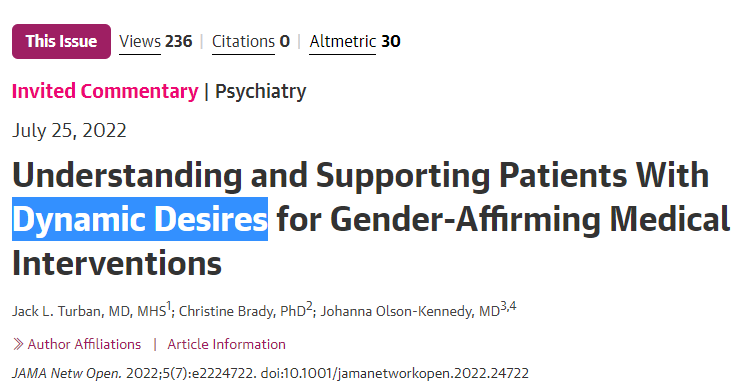My medical malpractice is now your "dynamic desire for gender-affirming medical interventions"
“Dynamic desires for gender-affirming medical interventions” sure is a ballsy way to refer to medical harm, regret, and detransition.
Gender clinicians really, really, really don't want to talk about medical harm, regret, and detransition. Better to talk about “gender fluidity” or “gender journeys”— “journeys” that may include stunting normal development with unknown consequences or removing healthy organs. And, most importantly, "journeys" that could not and should not have been prevented by gender clinicians.
Instead, we get these odd disquisitions on "regret" (safely contained in air quotes). What does it mean if a patient "regrets" medically unnecessary and life-changing surgeries and hormone regimens? Annelou de Vries and Thomas Steensma want us to unpack our ideas about what "regret" means. It's "too binary" to say a patient "regrets" or doesn't regret surgery. (We just need to queer our concept of what a good medical outcome is!)
Olson-Kennedy, Turban, and Brady want to remind everybody that "regret is a complex and heterogenous concept." (Now try that with ‘medical malpractice’!)
Asked about the possibility of regret and detransition, Olson-Kennedy wondered: “What does that actually mean? Does that mean that someone has additional breast tissue that they would not want at a later point? But they could get that breast tissue removed if they absolutely need to.” Or maybe you had your breasts removed but “if you want breasts at a later point in your life, you can go and get them.”
Or take Bernadette Wren, former associate director of the Gender Identity Development Service at the Tavistock, who writes these impenetrable monographs on autonomy and liberation and clinical responsibility as though it's pure theory. “The body cannot be ‘known’ outside of, or apart from, the grids of intelligibility that exist in our culture, any more than the mind can,” Wren muses, as though she were a middling contributor to a freshman philosophy seminar. But the children under her care were real—flesh and blood—not social constructs, not points on abstract “grids of intelligibility.”
Gender clinicians are desperately trying to bury mounting evidence of medical harm, regret, and detransition, mostly by draining meaning from language and redefining mountains as rainbow-spangled molehills that it would be ever so edifying to visit, even if you ultimately decide you’d rather move on.
Their best bet for getting out of this with their reputations and business models intact is to destroy the possibility of speaking clearly and objectively about the situation: that a growing number of young people regret medical interventions they received under an affirmative-care model that did not take the possibility of medical harm, regret, and detransition into account. Gender clinicians want to make the conversation about how "regret" is "too binary" and "detransition" merely reflects “dynamic desires for gender-affirming interventions.” They want to make the conversation about the interiority of flighty patients, not the responsibility medical providers have to all patients.
After all, if there’s no reality of the situation, what does it mean to say that someone—like a patient—got hurt or that someone—like, I don’t know, a doctor who took an oath to do no harm or something—did something wrong? How can we talk about harm if everything—mastectomies, hysterectomies—can be written off as part of someone’s “gender journey”?
If there’s no reality of the situation, does that mean that no one was responsible, nothing was preventable (and why should any of it have been prevented, in the first place?), and no one was harmed? Does it mean that nothing really happened? That we simply ‘let’ someone—a child, perhaps—be their ‘true self’ and then their true self changed?
There's a terrible inexorability to language like this—a promise not to learn from what critics might be unkind enough to call “mistakes.” Clinicians are in effect saying: By affirming children and adolescents in line with their current self-identification, we did the only thing that we could have done at the time. Then the times changed! It turns out self-identification was a moving target! That’s all. It was nobody’s fault. Nothing could have unfolded in any other way. (Notice all the passive voice?)
In the language of gender ideology, it's wrong to deny “trans children” “life-saving” “gender-affirming care.” Some people later experience "dynamic desires for gender-affirming interventions."
In plain English, it's wrong to drug, cut up, and sterilize children and young people, no matter what you call it. Harm is harm. Regret is regret. Detransition is detransition.






“We just need to queer our concept of what a good medical outcome is!” Yup, nothing escapes the steamroller of queering. Even children’s bodies. Even standards of care. Well guess what, I don’t want to live in a queered world and I am fighting this.
One of my old friends is both a lawyer and a doctor, and he became a psychiatrist who specialized in treating borderlines and other Cluster-B disordered patients for over 20 years. We were talking about the insanity that is the trans ideology and he said this:
"American psychiatry has been slow to respond to various examples of mass hysteria (like "recovered memories ", "multiple personality disorder", "satanic cult abuse", and "sudden onset gender dysphoria") and that's a good thing. Trouble is that, in the meantime, poorly trained "therapists" and advocates occupy the field speaking psychobabble. They convince well-meaning courts and legislatures that a fad, driven by social contagion, is a serious form of individually experienced distress "ignored by the patriarchal medical profession". Eventually, the boat turns right side up when the right people start getting sued for the right things. We're on track for that turning point in the transgender social movement."
I have to say Eliza - you have identified some of the specific individuals who need to have these law suits filed against them for their criminal behavior. It may take more time to dismantle the ideology, but we can certainly intervene legally to reduce the perpetration of terrible physical harms caused by these people pushing irreversible surgical and chemical maltreatments upon vulnerable innocents. Thank you for doing what you do and being who you are.